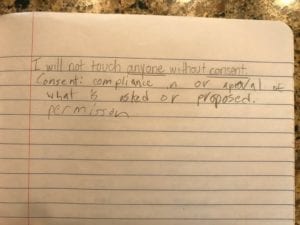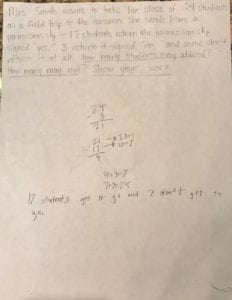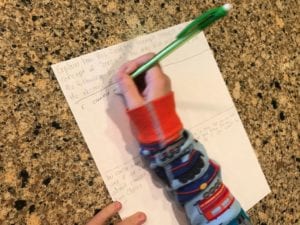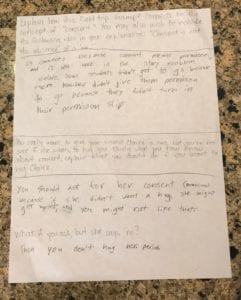I recently sat down to watch some not-so-kid-friendly TV. My boys were playing in their room, and I was pleasantly surprised at their contentment for about 30 minutes until I heard a scuffle going down. Wanting to see how or if they would handle it themselves, I awaited the inevitable. Sure enough, as one ran into the living room with the classic “MO-om!,” the other followed hot on his heels with a quick “Sorrysorrysorry! I said sorry!”
After giving each of my boys (ages 9 and 7) a chance to tell his side of the story, here’s what I discovered: one wanted the hot wheels positioned on the castle this way, while the other wanted it that way; they took turns jerking it back and forth; and then the older put his hands on the throat of his brother. The perpetrator tried to justify his behavior with two statements: “Ok, but he scratched me!”
“Was this before, during, or after your attempted choking?”
“During.”
“Well, of course he did. That’s called self-defense. If someone tried to choke me, I’d scratch him and do a lot worse!”
“Yeah, but he didn’t say stop!”
 And that right there is the exact point at which this argument turned into an entire morning unit about Consent. This was about more than cars and castles — this was now about respecting others’ bodies. And I was quick to let him know that. The first part of his extensive punishment that involved being grounded for a week was defining what he initially pronounced as “CON-sent.” Then, he had to explain what the written definition meant. Next, I showed him a list of synonyms, and he had to select one that was the most user-friendly to him. He settled on “permission.” Then, he had to give me an example of the term permission, and he wisely provided a field trip example. Perfect.
And that right there is the exact point at which this argument turned into an entire morning unit about Consent. This was about more than cars and castles — this was now about respecting others’ bodies. And I was quick to let him know that. The first part of his extensive punishment that involved being grounded for a week was defining what he initially pronounced as “CON-sent.” Then, he had to explain what the written definition meant. Next, I showed him a list of synonyms, and he had to select one that was the most user-friendly to him. He settled on “permission.” Then, he had to give me an example of the term permission, and he wisely provided a field trip example. Perfect.
After that, he had to write the following sentence 100 times: “I will not touch anyone without consent” (with those two words underlined. At first, he wrote each word individually. Nope. I need you to write and deeply consider that entire sentence. Together. As a thought. None of this “I, I, I, I, I, I… will, will, will, will…” No. “I WILL NOT TOUCH ANYONE WITHOUT CONSENT.” Do it one word at a time like that again, and I’ll add 50 more. But it didn’t stop there.
 Next up was a math word problem: “Mrs. Smith wants to take her class of 24 students on a field trip to the museum. She sends home a permission slip — 17 students return the permission slip signed ‘yes,’ 3 return it signed ‘no,’ and some don’t return it at all. How many students may attend? How many may not? Show your work.” Because seriously, we understand perfectly that without permission, other people cannot simply do with students what they want, yet we somehow disconnect this perfectly logical concept from contexts involving sexual consent. I won’t be an accomplice to that sort of thinking, so there was even more. (And in case you’re wondering, only 17 may attend. The other 7 may not because consent is not the absence of a no. No permission? No attendance.)
Next up was a math word problem: “Mrs. Smith wants to take her class of 24 students on a field trip to the museum. She sends home a permission slip — 17 students return the permission slip signed ‘yes,’ 3 return it signed ‘no,’ and some don’t return it at all. How many students may attend? How many may not? Show your work.” Because seriously, we understand perfectly that without permission, other people cannot simply do with students what they want, yet we somehow disconnect this perfectly logical concept from contexts involving sexual consent. I won’t be an accomplice to that sort of thinking, so there was even more. (And in case you’re wondering, only 17 may attend. The other 7 may not because consent is not the absence of a no. No permission? No attendance.)
Now, lest he get caught up in the challenge of his beloved math word problems, he had to connect those dots with short-answer questions: “Explain how this field trip example connects to the concept of ‘consent.’ You may also wish to include the following idea in your explanation: ‘Consent is not the absence of a no.'” Because CONSENT IS NOT THE ABSENCE OF A NO! You cannot put your hands on another person simply because (s)he didn’t say STOP! Are you kidding me?!
 And the kicker to verify that we took it all the way back to how we treat others now and in the future, he had to answer the following: “You really want to give your friend Claire a hug, but you’re not sure if she wants to hug you. Using what you now know about consent, explain what you should do if you want to hug Claire.”
And the kicker to verify that we took it all the way back to how we treat others now and in the future, he had to answer the following: “You really want to give your friend Claire a hug, but you’re not sure if she wants to hug you. Using what you now know about consent, explain what you should do if you want to hug Claire.”
I would hope that this goes without saying, but I’m going to say it boldly anyway: It is never too early to start talking to children about consent, and boys should be the first ones addressed. They must be taught to respect others’ spaces, bodies, and words. And not to protect them from allegations — it MUST be done because it’s the right thing to do. We cannot simply assume that they understand consent. Like everything else, from table-manners to using a toilet, they must be explicitly instructed in this area. It is our job as parents to do so, no matter how uncomfortable it makes us. IT. IS. OUR. JOB.
 But the good news is that this concept of consent manifests itself in any number of kid-friendly opportunities, like trying to choke a sibling over some freaking hot wheels. And I have to say that when I wrote the final follow-up question after reading his responses, I couldn’t be more proud of his response:
But the good news is that this concept of consent manifests itself in any number of kid-friendly opportunities, like trying to choke a sibling over some freaking hot wheels. And I have to say that when I wrote the final follow-up question after reading his responses, I couldn’t be more proud of his response:
“What if you ask [for a hug], but she says no?”
“Then you don’t hug her. Period.”
Period.



















Great job mama! I like your teaching style!